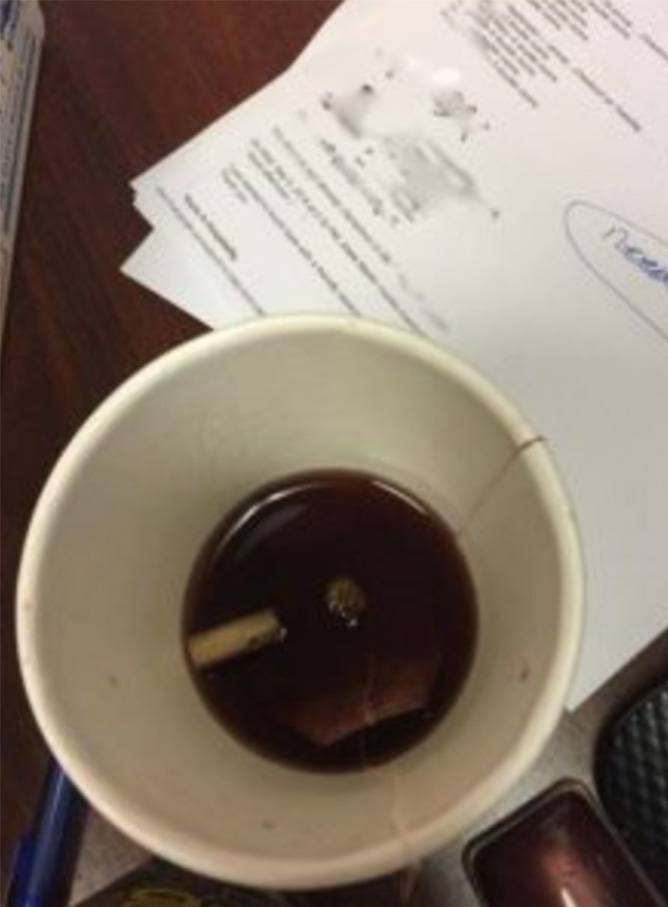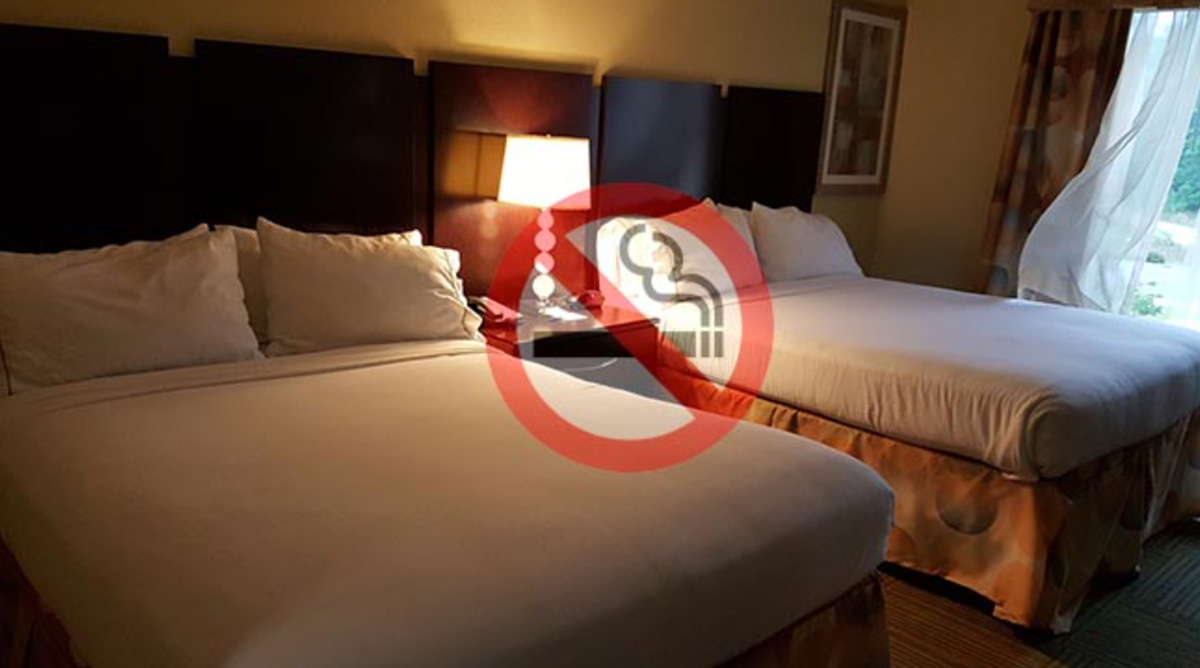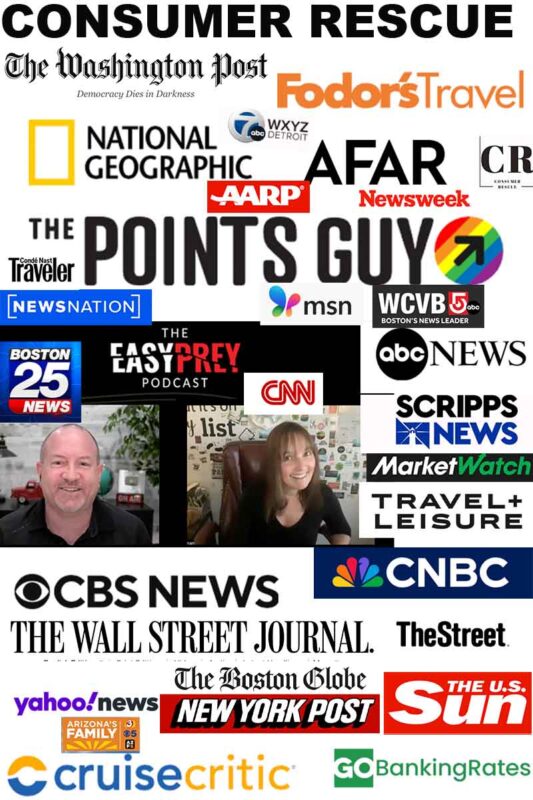Getting a surprise hotel smoking fee reversed isn’t easy — even if you’re a non-smoker like Kelsey Russell. Or a determined consumer advocate. But it can be done. Here’s how.
Kelsey’s case is yet another story that illustrates a disturbing trend that seems to be developing in the franchise hotel industry. Increasingly, we’re receiving complaints from guests who say these branded properties have hit them with an array of surprising post-stay charges — no proof included. But, as you’ll see in this case, even when the hotel provides “evidence,” it might just lead to more questions than answers.
“Please help me get this hotel smoking fee reversed!”
Kelsey’s ordeal began after a one-night stay at a Holiday Inn Express in Greensboro, N.C.
“My mother and I took my two-year-old on a road trip to spend one night inland during Hurricane Florence,” Kelsey recalled. “A few days after we checked out, I noticed an additional $200 debited from my bank account! When I called the manager, she told me that it was a smoking fee.”
Kelsey told the manager that neither she nor her mother smoked and that no one else had been in their room. The manager was unwilling to consider that someone at the hotel had made a mistake. So Kelsey asked for the evidence that led to this smoking charge. The manager said that the room smelled smoky and that someone found cigarette butts.
Kelsey told her that it would have been impossible for anyone to have found cigarette butts in her room.
“We don’t smoke,” Kelsey persisted.
Going around in circles with the manager and getting nowhere, Kelsey hung up and called her bank. She explained the unwelcome and unsubstantiated $200 debit on her account. Hoping for a quick resolution, she asked if the bank could have the hotel smoking fee reversed.
Unfortunately, the answer was not what Kelsey wanted to hear. A bank representative told her that their team would look into her complaint, but a traditional chargeback investigation would not be possible.
The Fair Credit Billing Act protects credit card using consumers
The Fair Credit Billing Act is designed to protect consumers against billing errors by merchants. These billing errors, among other things, include charges for goods or services that were unauthorized or not as described. Of importance to this case specifically, the FCBA covers:
- charges for which you ask for an explanation or written proof of purchase, along with a claimed error or request for clarification
However, the problem for Kelsey was that she used her debit card at this Holiday Inn Express. The FCBA does not protect debit card purchases. This fact is an essential piece of information with which consumers should familiarize themselves. And it underscores the importance of, whenever possible, using a credit card for significant purchases. A cynical person might even suggest that unscrupulous merchants might target debit-card-using customers, knowing that they can’t dispute the charge in the traditional way.
Of course, Kelsey isn’t the first consumer to have found out this vital tip one transaction too late. Regular readers of my column may recall the unfortunate tale of Meghan Robinson and Peaches, the sick little piglet.
In that case, the breeder provided no pig and no refund in the end. Because Robinson used her debit card to purchase Peaches, her bank couldn’t help. A year later she was still trying to figure out how to resolve this problem without a small claims lawsuit.
Can our advocacy team help get this hotel smoking fee reversed?
With the hotel manager and Kelsey’s bank offering no hope for a refund of her $200, her next email went to our advocacy team..
First, I should say that we almost never take these smoking fee cases. The reason being, that many of the travelers who contact us are, in fact, smokers. While they’re shocked at the charges, they frequently admit to “emptying an ashtray from my car in the room” or leaving behind “an empty pack of cigarettes.”
When a hotel guest brings any remnants of cigarettes or ashes into their hotel room, they’re opening the door to a hotel smoking fee. We probably all know a smoker who doesn’t realize that they smell of smoke — even when they aren’t smoking. And in a world that is becoming increasingly smoker-intolerant, it is imperative for smokers not to bring any evidence of their habit into a smoke-free hotel property.
Fact: Most hotels today have each guest sign a little card at check-in that allows the hotel to charge a smoking fee. Depending on the hotel, that smoking fee is typically between $200 and $300, although in 2024, we’ve seen some hotels charge up to $500 for “remediation.” It’s important to note that nowhere on that card does it say what level of proof, if any, the hotel must have to charge your card on file.
Smokers beware! Hotels are liberally applying this smoking fee
We know from the complaints our advocacy team receives that hotels are liberally applying this smoking fee. Maybe too liberally since nonsmokers are being hit by it also.
Of course, the problem for our advocacy team is that we don’t personally know the consumers who contact us for help. And I’m sure it’s no surprise to any of our regular readers to hear this, but not all the consumers who contact us are 100 percent truthful. While some consumers might leave out important parts of their cases, others stretch the truth beyond all reasonable limitations (Did an in-flight injury really nearly kill her?).
And so, before our team directly advocates a case, we must be reasonably confident that the consumer has presented accurate facts. Our reputation with the companies we work with is on the line.
In this case, Kelsey said that no one in her party smoked during their stay. And she pointed out that she had her toddler with her.
“Why would anyone in their right mind smoke while sharing a small room with a toddler?” she asked.
Some might call me gullible in this instance, but as a mom and nonsmoker myself, that convinced me.
So I decided to see what kind of evidence the hotel had to support this smoking fee.
The proof in this hotel smoking fee dispute stinks
In many of the cases that I’ve recently advocated that involve surprise post-checkout charges, the managers have provided no evidence at all. And in other cases, the hotel has just ignored our contact altogether (See: Pillow thievery at a 2-star hotel).
I hoped that the manager of this Holiday Inn Express would be able to shed some light on this case. So I contacted her and asked that she forward the evidence that led her to charge Kelsey a $200 smoking fee.
Soon I heard back from the manager who, citing guest privacy rules, told me that she didn’t have permission to speak to me. As you’ll see shortly, her concern about guest privacy doesn’t extend to all her guests. But I pointed to the waiver signed by Kelsey permitting me to advocate on her behalf and again asked for some justification of the $200 charge:
Unfortunately, we have seen an uptick in franchise owners charging guests post-stay for ‘damages’ that haven’t been substantiated. This practice is not customer-friendly. We have been investigating this new trend for some time now. If this guest caused some damage or made the room uninhabitable in some way, then please send that documentation. Thank you.
The hotel’s attorney: “Our staff found evidence” to support the smoking fine
Very soon, I received an email from the attorney representing the franchise management company that owns this hotel.
Michelle Couch-Friedman,
Our company policy is to charge a $200 smoking charge if there is both physical evidence and smell evidence of smoking in the guest’s room. Ms. Russell initialed the attached registration acknowledging that she understood this policy. Upon checkout, our staff found physical evidence in the form of cigarette butts in a coffee mug and the room smelled of smoke (picture also attached).
When I opened the photo, for just a moment, I felt duped by Kelsey. There was a picture of a coffee cup, on a desk, with cigarette butts inside.
Yikes!
So Case Dismissed? No, not so fast. Let’s look closer at this “evidence.”
What does this photo really show?
I enlarged the photo and then looked at everything inside the frame. And what I saw made me more determined to get this hotel smoking fee reversed.
This photo is a snapshot of a coffee cup with cigarette butts inside. True. But it’s the location of the cup that makes it questionable.

The cup is not in a hotel room. It appears to be sitting among the clutter on top of the manager’s desk. An email with another guest’s personal information is clearly visible. And the email is dated one week before Kelsey checked into the hotel. Lastly, the metadata of the photograph says “212 Kelsey smoking.” Russell was in room 417.
Is this smoking evidence or hotel shenanigans?
Some might call this evidence, but I call it possible shenanigans. If a hotel intends to help themselves to $200 from a guest’s bank account, the proof should be convincing to a third party’s eye. This wasn’t.
I went back to the attorney and highlighted all the problems with the evidence (and the breach of the privacy of the other guest who has nothing to do with this case). I asked that the manager reverse this smoking fee in light of all these oddities and the fact that nothing tied Kelsey to that coffee cup on the manager’s desk.
This guy wasn’t going to bend though. He conceded that the coffee cup was on his manager’s desk and that I could see another guest’s information. But he said that the other guest is a local public figure, so her information is publicly available anyway.
Uh — ok, but her hotel reservation isn’t publicly available information. And I could see her reservation information. And none of this pointed to Kelsey as the owner of that coffee cup.
One last try to get this smoking fee reversed
I tried one last time to get a reasonable resolution with this management company’s “in-house counsel.”
Kelsey believes this was a mistake and that she has been misidentified. She says that no one in her group smokes. She had her baby with her in the room. I understand that there are times that guests smoke in rooms and then don’t tell the truth about it. That’s why it’s imperative for hotels to keep accurate documentation of any damage done. It’s a troubling trend that we’ve seen where franchise hotels charge for all sorts of damage — not just smoking charges — without any evidence at all. The evidence presented here is questionable.
His final words on the topic still didn’t address the inconsistencies in the photo. But the case was closed on his side.
The fact remains that Ms. Russell authorized the charge of $200 if we found that someone had smoked in the room. Immediately after checkout, the cup pictured was found in the room by housekeeping and the room smelled of smoke. The $200 charge covers our cost of getting the room professionally cleaned to remove the smoke odor so that we can rent the room to other guests.
Curiously, the attorney did not include the receipt to show that the hotel had paid to have Kelsey’s room professionally cleaned. That receipt would seem to be far better proof than a coffee cup sitting on his manager’s disorganized desk.
But it was time to move on. This mediation attempt wasn’t going anywhere.
Asking for help from our friends at IHG
Our advocacy team knows the Intercontinental Hotel Group to be a fair and reasonable company. So I assumed that the parent company of this franchise would be able to straighten this out for Kelsey. And I hoped their resolution team would see it my way and that we could get this hotel smoking fee reversed.
I sent the same evidence and information to our executive at IHG. Soon Kelsey received a phone call from the manager of the hotel. Much to her relief, now the manager told her that she would reverse the smoking fee. And although she called it a goodwill gesture, I would call it the correct resolution.
How can you get a hotel smoking fee reversed?
If you find yourself in a situation where a hotel is charging you for damage you didn’t do — including a clean-up fee for smoking, here’s what you can do.
- Call the hotel and find out the name and email address of the manager. Then stay off the phone.
- Compose a short and polite email to the manager and ask for the incident report and supporting documentation for the charge. Make sure you follow the self-advocacy guidance in my article about fixing your own consumer problem.
- If you are unable to reach a favorable resolution with the manager, reach out to one executive at a time for your hotel’s parent company. If you need help finding executive contacts, you can Just Ask Meera – she’ll find the information for you. Give the first executive a week to respond. If, after a week, you have received no positive response, you can escalate your email to the next executive and so on until you have gone up the corporate chain.
- If all else fails and you used a credit card to pay for the hotel and are confident that the charge is unjustified, it’s time to initiate a chargeback dispute. But remember, a credit card chargeback should always be the last step in your attempt to resolve a conflict.
And don’t forget, anytime along the way, you can contact the Consumer Rescue team for guidance. We’re always here to help. (Michelle Couch-Friedman, Consumer Rescue)
*Before you go: Here’s how to get a fake car rental cleaning fee reversed.


